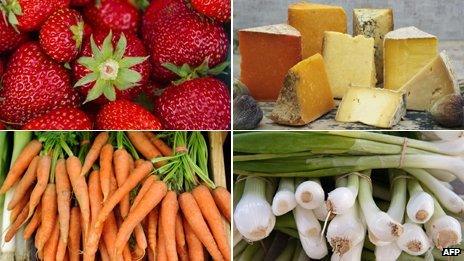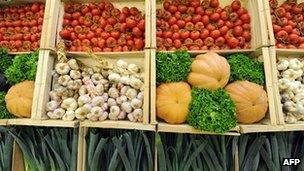Does farmers' market food taste better?
- Published

Does it all taste better from a farmers' market?
There are now thought to be up to 750 farmers' markets in the UK, according to the Farmers' Retail and Marketing Association (Farma). But is it the taste of the produce that keeps the customers interested?
"It's quite hard work, it's quite physical. You're humping apples, pears and plums around in crates," says Martin Harrell from Hayles Fruit Farm, a supplier to both supermarkets and farmers' markets.
According to Mr Harrell, the fruit produce at the local market tastes better than the supermarket equivalent, and is sold at a competitive price.
The small supply chain and short distance that the product travels cuts costs. It also protects quality, he says.
"[Market fruit] has literally gone from the farm to the market stall. You know, it hasn't been put on a lorry, it hasn't gone into overnight refrigeration, it hasn't been picked up out of that refrigeration and put onto a lorry and it hasn't come off the lorry onto the supermarket shelves."
The local sourcing, fresh ingredients and traditional production techniques that define the modern farmers' market have been part of a revival over the last decade.
The first of these new markets took place in Bath in 1997, according to Farma, the membership body that monitors standards.
The number of farmers' markets has multiplied hundreds of times over since then, reaching about 750 by 2009, and is thought to have remained fairly stable since, the association says.
Sue Thomson, a standards adviser for Farma, says that this interest in "localness" is at the heart of what earns Farma members the stamp of approval.
"[The] core criteria... is that the market has a definition of local... The norm is 30 miles from the market... and you would normally hope to find the producer actually standing at the stall to sell his own products," she says.
All in good taste?
In research to be published in August in the journal Appetite, external, Dr Keith Spiller analyses some consumers' ways of talking about farmers' market food.
He suggests that "taste" can be as much about the place as about the food.
Experience the fun of a farmers' market
"For example, a farmers' market sausage, which looks and feels like a conventional or non-market sausage, gains status because it is not a mainstream sausage," Dr Spiller says in his article.
It plays into an argument that has surrounded the specialist food market for a long time - with some viewing them as overpriced and snobbish, and others as a reasonably priced source of specialist produce.
"I think they [farmers' markets] were regarded as being elitist, certainly in the early part of the last 10 years because there was a sense in which they didn't want to be seen to be associated with general markets.
"They felt they were a cut above general markets," says Graham Wilson, chief executive of the National Association of British Market Authorities (Nabma), which represents mainly local authority markets.
That elitism, he says, has now been eroded to some extent.
"I think there's more connectivity between general markets and farmers' markets and people see them as sort of elements of the same market offer."
It seems that the wider community and a sense of inclusion have become increasingly important in assessing the success of markets.
Food writer and broadcaster Valentine Warner will be judging the Best Food Market category at the BBC Food and Farming Awards, which is currently open for nominations.
"I'm looking for ingenuity… like markets that started from difficult places or different areas, the inclusion of community and the environment, and that are really in the interests of the seller and the buyer," he says.
Previous winners include Bolton Market, which attracts around three million customers a year, contributing £15m to the local economy, and Stroud Farmers' Market, which now includes over 60 traders.
"I went this weekend to the Heathfield market, bought an amazing croissant made by a Frenchman, and the best bacon from a local farmer. I fried beetroot with the bacon… and ate the croissant the next day," he says.
"A local market is a bastion for things that come from that area - a Dorset market will have different things to a Lincoln market, and it preserves our food history and culture to a certain extent."
But he says that it is also about generating new opportunities for the community.
"I love cottage industry and markets help people who make things, sell things they otherwise wouldn't sell - like Mrs Miggins who makes lemon curd."
It was the local rejuvenation resulting from the success of the Hitchin Market, West Norwood Feast and Tavistock Real Cheese Fair that led retail expert Mary Portas to recommend a national market day to the government when she wrote her review on the future of the high street, external. She hoped that it could encourage a new wave of local entrepreneurialism.
The Markets Alliance, which includes Nabma and Farma, is now supporting a range of initiatives to celebrate National Market days around the country over the next fortnight.
The focus will be on generating opportunities for first-time traders and celebrating markets as a focal point in the local community.

"I don't necessarily think the argument is about taste" - Jane MacIntyre, from Hackney Homemade
It is the kind of ethos that led Jane MacIntyre to set up Hackney Homemade in London, where the Saturday food market has aimed to build an accessible and community-driven market place.
"I wanted to showcase local talent and produce and also to have it very much a community sort of market place that's accessible to everyone," she says.
"The idea is yes, we have artisan breads and artisan cheeses and organic produce, but also it's very affordable and very accessible."
The market has been running since February and Ms MacIntyre says it has become an important part of the community.
Her 90 year-old neighbour will walk for 20 minutes to buy eggs at the market, she says.
"I don't necessarily think the argument is about taste, it's about seasonality, it's about provenance, it's about food miles, it's about sustainability, it's about supporting the small producer and not the big producer markets," she says.
- Published12 March 2012
- Published8 May 2011
- Published7 May 2011